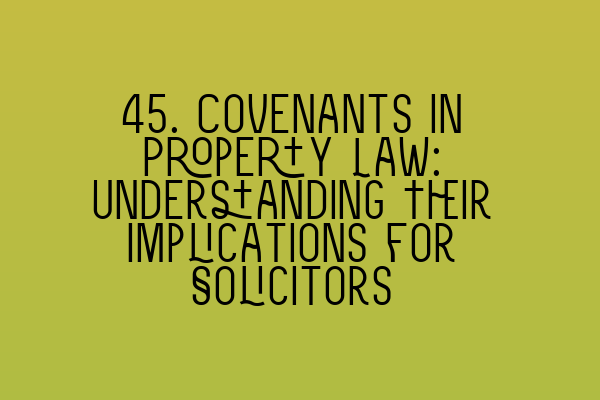45. Covenants in Property Law: Understanding Their Implications for Solicitors
As a solicitor, understanding the implications of covenants in property law is crucial for providing effective legal advice and representation to your clients. Covenants are legally binding promises related to the use or ownership of land and properties, and they can have significant implications for property transactions and disputes.
In this article, we will delve into the complexities of covenants in property law and discuss how solicitors can navigate and interpret them to protect their clients’ interests. By gaining a comprehensive understanding of covenants, you can enhance your legal expertise and effectively guide your clients through various property-related matters.
1. What are Covenants in Property Law?
A covenant is a legal agreement between parties that imposes certain obligations or restrictions on the use of land or property. Covenants are typically set out in writing within the relevant property deeds, leases, or other documents related to the property transaction.
Common types of covenants in property law include:
- Restrictive Covenants: These are covenants that limit or restrict a property owner’s use of their land or property. They are often put in place to protect the aesthetic or environmental qualities of an area. For example, a covenant may prohibit the construction of certain structures or the operation of specific businesses.
- Positive Covenants: Unlike restrictive covenants, positive covenants require a property owner to take certain actions, such as contributing to the maintenance of shared facilities or complying with specific regulations. These obligations usually extend beyond the original owner and are binding on subsequent owners of the property.
- Enforceable Covenants: Some covenants can be legally enforced by individuals or organizations. These are known as enforceable covenants, and they allow affected parties to take legal action against any breaches of the covenant.
- Unenforceable Covenants: On the other hand, unenforceable covenants cannot be legally enforced, and a breach of these covenants does not give rise to any legal remedies or actions.
Understanding the classification and implications of covenants is essential for solicitors when advising clients on property matters and ensuring legal compliance.
2. Key Considerations for Solicitors
When dealing with covenants in property law, solicitors must carefully consider the following aspects to provide effective legal support:
a. Identifying Covenants
It is crucial to identify any existing covenants that may affect a property. This requires thorough examination of the property’s title deeds, leases, and other relevant documents. By conducting a comprehensive review, solicitors can determine the nature, enforceability, and potential implications of each covenant.
SQE Property Law & Land Law offers comprehensive preparation courses for the SQE exams. Check out our SQE 1 Preparation Courses to enhance your legal knowledge and skills.
b. Interpretation and Advice
Interpreting covenants can be complex, as their language and scope may vary. Solicitors need to carefully analyze the wording and overall context of the covenant to determine its effect on the property and its owners. Once the interpretation is established, solicitors can provide tailored advice to clients regarding their rights, obligations, and potential remedies.
c. Drafting and Negotiating Covenants
When involved in property transactions, solicitors may need to draft or negotiate covenants on behalf of their clients. This requires a strong understanding of the client’s objectives and the legal implications of the proposed covenants. By drafting clear and comprehensive covenants, solicitors can protect their clients’ interests and minimize the risk of future disputes.
If you’re preparing for the SQE exams, our practice exam questions can help you test your knowledge and build confidence. Take a look at our SQE 1 Practice Exam Questions and SQE 1 Practice Mocks FLK1 FLK2 for comprehensive exam preparation.
3. Dealing with Breaches of Covenants
In cases where a covenant is breached, solicitors play a vital role in helping their clients understand their legal options and potential remedies. This may involve negotiation, mediation, or initiating legal proceedings to enforce or modify the covenant as appropriate.
a. Enforcing Covenants
Solicitors can assist clients in enforcing their rights under a covenant by seeking injunctions, damages, or specific performance orders. Enforceable covenants provide legal recourse for aggrieved parties and ensure compliance with the terms agreed upon by the parties involved.
b. Modifying or Discharging Covenants
In certain circumstances, solicitors can help clients modify or discharge existing covenants. This may involve obtaining consent from relevant parties, demonstrating a change in circumstances, or initiating legal proceedings to seek modification or discharge.
At SQE Property Law & Land Law, we provide comprehensive preparation courses for SQE 2. Visit our SQE 2 Preparation Courses to enhance your knowledge and skills for the upcoming exams.
4. Conclusion
Covenants in property law have significant implications for solicitors and their clients. Understanding the types, enforceability, and potential consequences of covenants is crucial for providing effective legal advice and representation.
If you’re preparing for the SQE exams, it’s essential to have a solid grasp of property law. Check out our SRA SQE Exam Dates to plan your preparation, and explore our comprehensive preparation courses for the SQE exams at SQE Property Law & Land Law for the best support in your legal journey.
